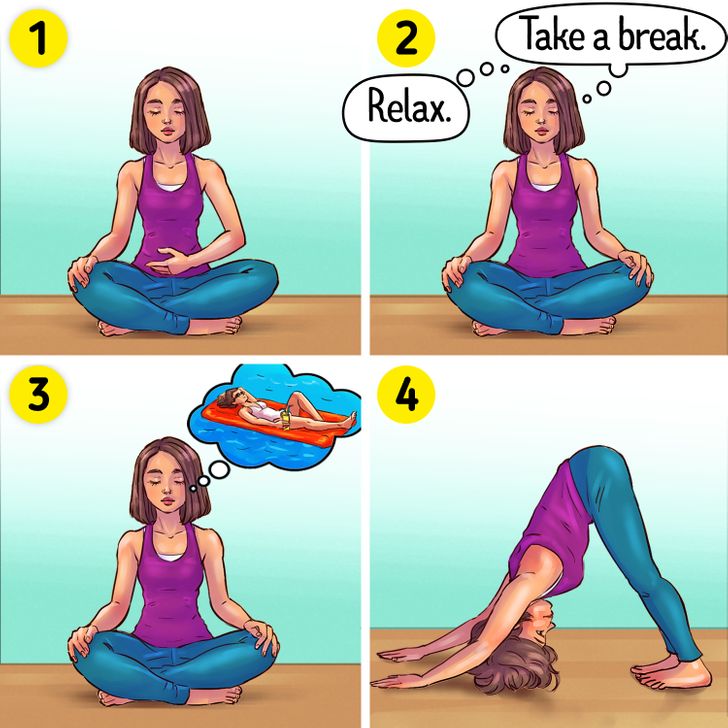How to Control Your Emotions and Stop Being Angry

We can feel angry and disappointed because of little things, but sometimes these feelings can be caused by real and inevitable difficulties. Being angry is not always inappropriate — sometimes it’s a healthy and natural reaction. After all, the idea that every problem can be solved can make the situation even worse when we realize that it’s not always the case. The best thing you can do is not focus on solving the problem but on controlling your emotions.
5-Minute Crafts know how to relax and prevent angry outbursts with the help of a few effective strategies.
Use relaxation techniques.

Simple relaxation techniques, such as deep breathing and visualizing a relaxing experience, can help keep your anger under control. Here are a few simple steps you can take.
- Breathe deeply from your diaphragm. Imagine that your breath is coming out of your gut. Breathing from your chest won’t relax you.
- Slowly repeat soothing words or phrases, such as “relax” or “take a break.” Remember to breathe deeply.
- Use imagery: visualize something that relaxes you. Think back to something from your past or use your imagination.
- Easy, slow exercises, like yoga, can help relax your muscles. You will feel much more relaxed.
If you feel angry often, practice these techniques daily. Learn to use them automatically when you find yourself in a tense situation.
Think logically and reconstruct the situation.

Angry people tend to curse everything in the world, swear, and speak in highly colorful terms — their thinking becomes exaggerated and overly dramatic. Try replacing these thoughts with more rational ones. For example, instead of saying to yourself, “Oh, this is terrible, everything is ruined,” say, “It’s obvious that I am upset, but this is not the end of the world, anger won’t fix the situation, and it won’t help me.”
Be careful with words like “never” and “always” when talking about yourself or someone else. You use expressions like, “You always forget something,” to justify your anger without looking for another way to solve the problem. These expressions also alienate people who might have helped you find the solution.
Anger won’t fix anything nor will it make you feel better. On the contrary, you’ll feel even worse. Anger can quickly become irrational, so use cold, hard logic on yourself. Remember that the world is not against you, you are simply experiencing difficulties at a particular time. Do this every time you feel your anger taking over, and it will help calm you down a little.
When people are angry, they start demanding things: justice, gratitude, or agreement. As part of cognitive restructuring, you need to become aware of your demanding nature and translate your expectations into desires. In other words, you should say things that include “I would like” instead of “I demand.” When you can’t get what you want, it’s normal to feel disappointed or hurt but not angry. Sometimes people use anger as a way to avoid feeling hurt, but that doesn’t mean the pain will go away.
Get moving.

Anger gives you a rush of energy. One of the best ways to make good use of this surge is through physical activity. Whether you go for a walk, a run, or hit the gym, working out will help release your tension.
Regular exercise can also help you relax. Aerobic activity reduces stress, which makes it easier to endure situations where our desires don’t match our possibilities and frustrate us.
Besides, exercise can clear your mind. You may find that after a long run or hard workout, you have a clearer perspective of what was bothering you.
Use silly humor to lighten the mood.

When you’re angry and want to call someone a name, stop and imagine what this word would look like, literally. For example, if you think of your colleague as a “single-cell creature,” imagine a large amoeba in their place sitting at a table, talking on the phone, or going to the next meeting. You can even draw what it might look like in reality. Doing so will ease the anger and defuse a tense situation.
Angry people tend to think that they are morally right. Any obstruction of plans or a change in them is an unbearable humiliation, which leads to inevitable suffering. If you suddenly feel this way, imagine yourself as the supreme ruler who owns the streets, shops, and offices. Only you alone achieve your goals in all situations, while others report to you. The more details you can make up for this imaginary scene, the more likely you are to realize that you may be acting unreasonably. You will also realize how insignificant the reason for your anger is.
❗️ Beware of 2 things when using humor. First, don’t try to laugh off your problems, just try not to take yourself too seriously. Second, don’t give in to harsh, sarcastic humor. This is just another form of an unhealthy expression of anger.
Be aware of your anger warning signs.

It might seem like you explode with anger without warning. However, there are signs signaling that your anger is about to get out of control. Recognizing them at an early stage can help you cope with the situation.
Pay attention to how you feel before the outburst. Perhaps your heart is beating faster, your cheeks are flushed, your breathing quickens, and you are clenching your fists. You can also notice some cognitive changes: your thoughts begin to jump from one to another, problems with concentration arise, and you’re “seeing red.”
Once you recognize these warning signs, you have the opportunity to take immediate action and not let yourself do or say things that you will later regret.
Change your environment, and find some time for yourself.

Sometimes it’s our immediate environment that gives us a reason for irritation and rage. Problems can weigh on us and make us feel angry at the “trap” we find ourselves in and all the people and things that form that trap.
Give yourself a break. Make sure you have time for yourself during a particularly busy period of the day. For example, if you are a working mother, you can have a rule: When you come home from work, no one should talk to you for the first 15 minutes. After this short, calm period of time, you will feel more prepared to handle demands from your family members without blowing up at them.
Make your own “calm down kit.”

If you come home from work stressed and take out your anger on your family, start using a “calm down kit.” Think of the things that help you relax and engage all your senses. The bottom line is that when you can hear, see, taste, smell, and touch things that you like, your emotional state will change for the better.
A calm-down kit may include scented hand lotion, serene landscape photos, favorite poems to read aloud, and a couple of delicious chocolates. You can add anything that awakens pleasant feelings in you and makes you relax in a cozy and comfortable atmosphere.
You can create a virtual set that you can carry along and use at any time. It may include soothing music and images, guided meditation, or instructions for breathing exercises. Store such a set in a special folder on your smartphone.